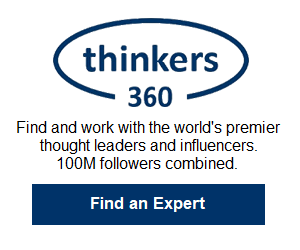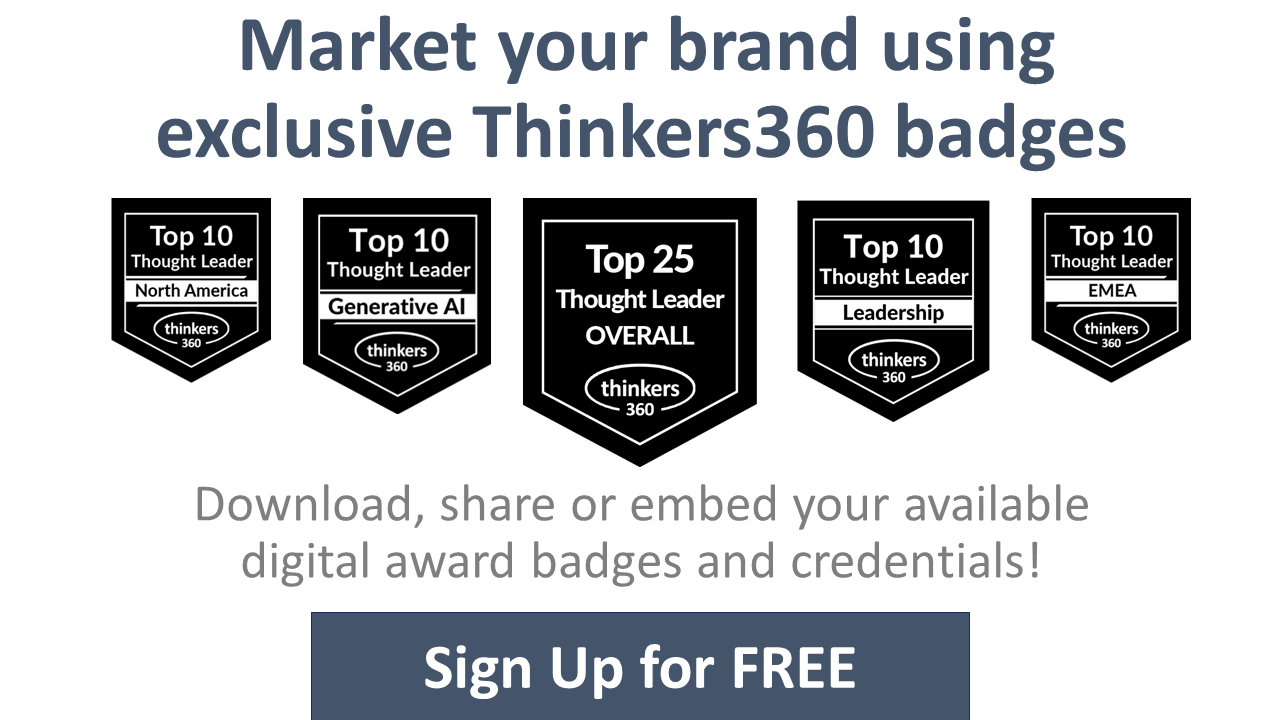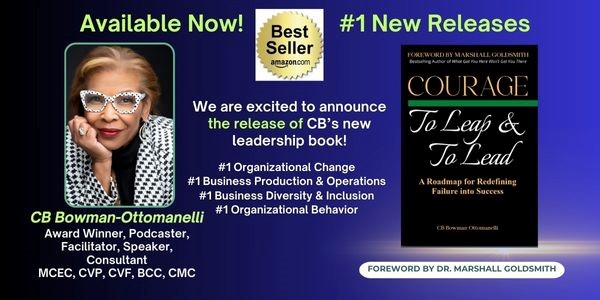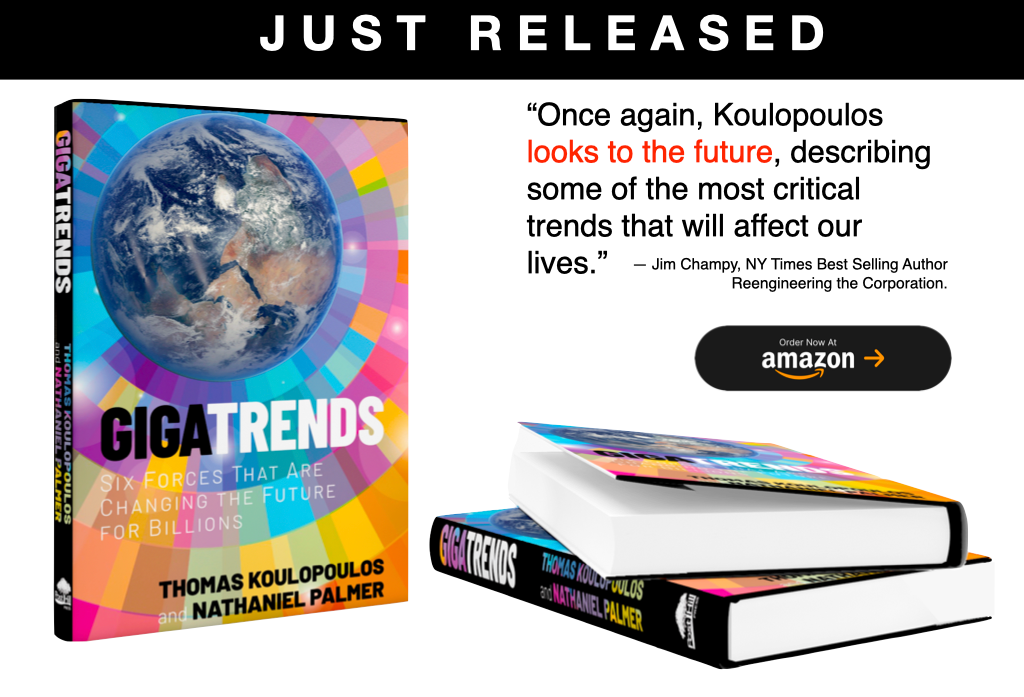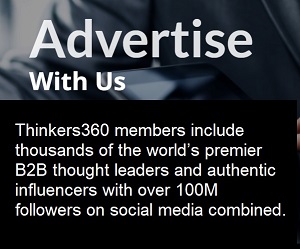As I’ve been observing cultural shifts over the past year, it’s become increasingly clear that many of the forces shaping our future aren’t new at all....
What we call cultural trends often linger beneath the surface—latent, quietly shaping behavior until something accelerates their emergence. In the early 2010s, the global recession exposed fissures in trust and belonging, driving the rise of new forms of leadership and connection. Indeed, this was the cultural moment in which my model of Brand Citizenship emerged—a response to the void left by faltering institutions and a recognition that brands could rebuild trust by delivering both personal and societal value.
Then, as now, the dissonance between institutional promises of recovery and lived experience brought deeper needs to light. While that era gave rise to the movement for purpose, today, we find ourselves in a similar, yet more intense, moment of acceleration. The U.S. election and continued global polarization are amplifying cultural tensions, shaking loose what has been building for years. This time, however, the shifts feel more profound: an even deeper reckoning with opposing forces—freedom and security, creation and destruction, individual expression and collective belonging.
And yet, in this tension, I see possibility. Beneath the noise lies a growing desire for something more lasting, more resonant, more human. The trends shaping 2025 reflect this paradox—a mix of urgency and patience, disruption and discernment. They remind us that cultural evolution is not always about what’s new. Rather, sometimes it’s about what’s been waiting to be seen, heard and felt.
If history has taught us anything, it’s this: Purpose is not dead. Like an ethos of trust and connection and strategic planning as a way to guide operations, it is simply waiting for a new form—one that feels more honest, more actionable and more aligned with where we are now.
Seven cultural trends for 2025
- The Age of Accelerated Reckoning
Periods of disruption often accelerate forces that have long been latent, and 2025 marks an intensified cultural reckoning. As systems and structures—political, economic, and social—continue to fracture, the gap between what exists and what is possible grows ever clearer.
People are demanding more from the institutions they rely on, seeking reinvention rather than repair. What was once gradual and linear is now urgent and nonlinear, fueled by an artisan-like drive to dismantle outdated models and imagine something fundamentally better. Artisanship here isn’t limited to craft—it reflects a dedication to rebuilding with skill, care, and purpose.
- Example: The rise of grassroots movements demanding systemic reform—whether through local governance initiatives, worker-owned cooperatives, or new approaches to housing—reflects this growing appetite for systemic reinvention over patchwork solutions.
- Takeaway: This moment invites organizations to look inward—examining assumptions, values, and systems— and to ask what might be recreated with greater intention. For brands, this may mean prioritizing “crafted impact”: rethinking product design, storytelling, or operations with a level of artisanship that mirrors cultural values of care, authenticity, and longevity.
- Discernment Over Distraction
The world has reached a point of saturation—too much noise, too much content, too many quick fixes. The relentless overload has created a cultural yearning for clarity, meaning, and intentionality.
Discernment is a counterbalance to distraction, a way of navigating complexity with greater wisdom. Over the next year, people will become increasingly discerning—about what they consume, where they spend their time, and whom they trust. Superficial narratives and hollow promises will cease to suffice; instead, the desire for depth, substance, and true authenticity will rise.
- Example: The “quiet luxury” movement in fashion and design—marked by craftsmanship, subtlety, and enduring quality—signals a rejection of flashy trends in favor of understated, lasting value.
- Takeaway: For leaders, this sentiment underscores the importance of offering clarity and depth. Simplifying messages, focusing on intentional actions and prioritizing substance will foster trust in a world where attention is increasingly precious.
For brands, particularly in luxury, this shift offers an opportunity to focus on essence over excess, curating experiences and products that embody elegance restraint, and meaning. Quiet luxury is as much about storytelling as it is about design—rooting messages in heritage, values and craft emotively engages a more discerning audience.
- The Longing for Connection—Human and Planetary
In an increasingly fragmented and disconnected world, the deep longing for connection is growing stronger: connection with ourselves, with others, and with the planet. The forces of globalization, technology, and geopolitical tension are leaving many feeling isolated and untethered. In response, people are seeking relationships and experiences that feel restorative, grounding, and purposeful.
Connection is no longer optional—it’s essential for well-being, healing, and progress. Alongside human connection, we see a parallel desire for deeper harmony with the natural world, as people recognize the interconnectedness—and essential importance—of all living systems.
- Example: Community-led initiatives like urban food forests or regenerative agriculture projects show how people are finding shared purpose by reconnecting with local ecosystems and sustainable living practices.
- Takeaway: Cultural longing invites organizations to explore ways to create spaces for connection and belonging. Serving as facilitators of both human and planetary harmony will strengthen relationships and build trust.
Brands can explore how to become connectors—whether through shared physical spaces, collaborative platforms, or campaigns that unite people around common causes. Patagonia’s Worn Wear program, for instance, fosters both human connection (through shared values) and planetary harmony (by extending product life cycles).
- Freedom as Cultural Currency
The quest for freedom—freedom to express, to create, and to live authentically—will be one of the defining forces of 2025. Amid external constraints and growing societal pressures, people are pushing back against rigidity, seeking autonomy over their time, identities, and work. The pushback on return-to-office mandates is one clear reflection of this shift—a demand for autonomy that challenges traditional systems.
Self-expression and fluidity are no longer indulgences; they are pathways to fulfillment, creativity, and growth. Freedom is a cultural currency that enables people to feel seen, heard, and valued on their own terms.
- Example: Platforms like Substack, Patreon, and independent creator tools are enabling people to reclaim agency over their work, creativity, and audience relationships, bypassing traditional gatekeepers.
- Takeaway: Organizations can support this cultural drive by rethinking traditional systems and structures. Flexible work arrangements, platforms for co-creation and spaces for authentic self-expression enable autonomy and creativity, fostering more engaged and fulfilled teams.
For brands, this shift offers an opportunity to empower individuality and creative freedom. Consider how Nike’s By You platform allows consumers to personalize products, giving them an active role in shaping their experiences and expressing their identities.
- The Power of Regeneration
Destruction and creation exist in tension, yet they are inseparable forces. In 2025, the focus will shift toward regeneration—actively restoring, renewing and rebuilding systems that support life, trust and progress.
This mindset extends beyond sustainability, which seeks to maintain what exists, to embrace practices that heal and renew. Whether through ecosystems, relationships, or communities, regeneration reflects a recognition that growth without restoration is unsustainable.
- Example: Cities like Amsterdam experimenting with circular economies—reducing waste, reimagining commerce, and rebuilding local ecosystems—offer a model for regenerative practices that can reshape entire systems.
- Takeaway: The emerging emphasis on renewal invites leaders to explore opportunities that move beyond maintaining the status quo and contribute to restoring trust, health and ecosystems
Brands themselves can apply regenerative principles by prioritizing circular product systems, restoring trust in fractured relationships or championing initiatives that revitalize local economies. Reformation’s focus on circular fashion provides a tangible example of this regenerative ethos.
- Embracing Tension as Creative Fuel
2025 will be marked by cultural tension: between stability and change, freedom and security, destruction and creation. While tension often is perceived as an obstacle, it is also a catalyst for creativity.
This moment invites people to hold ambiguity and complexity rather than resist it. In tension lies the potential for profound breakthroughs, as opposing forces generate the energy needed for transformation.
- Example: Hybrid cultural spaces—blending work, play, and community—reflect a willingness to dissolve binaries and use tension as a foundation for innovation. Such spaces show that creativity often arises when we embrace “both/and” rather than “either/or.”
- Takeaway: Navigating this cultural tension requires courage and imagination. Leaders who embrace ambiguity over fear and see complexity as an opportunity for growth—not a call to dig into what’s known—will unlock creativity and resilience.
For brands, this may mean fostering ‘safe’ and even ‘brave’ spaces within teams—inviting debate, diverse perspectives and experimentation to drive innovation.
- Slower, More Intentional Living
The acceleration of modern life continues to leave many burned out, disconnected, and craving meaning. As a response, a cultural pivot toward slower, more intentional living is accelerating—but in a form distinct from earlier slow-living trends. Unlike the romanticized simplicity of the 90s (think Baby Boom, the 1987 film with Diane Keaton) or the enforced slowness of COVID, today’s movement is more deliberate, shaped by an active choice to savor, prioritize, and reconnect.
- Example: The rise of “slow travel”—favoring immersive, thoughtful experiences over rushed itineraries—demonstrates a growing cultural desire to deepen connections with people, places, and cultures.
- Takeaway: For organizations, the call is for value creation that is enduring, thoughtful and enriching. Experiences that encourage presence and well-being will resonate particularly as people returning to the office seek to reclaim their time and focus on what truly matters.
Brands have an opportunity to move from speed to substance, developing offerings that prioritize quality, presence and meaning. Whether through slower retail models, immersive experiences or campaigns that promote mindful living, brands can play a role in fostering a more intentional way of life.
Final Thought: A Reckoning of Opposites
The trends shaping 2025 remind us that cultural evolution often emerges from opposition and paradox: between destruction and creation, disconnection and connection, acceleration and intention. As in the 2010’s, these tensions are not obstacles; rather they are catalysts, inviting us to dismantle what no longer serves individuals, societal harmony and sustaining our planet—and to reimagine what can take its place with clarity and courage
In this space lies an invitation: to observe to listen, and to imagine something better. For brands willing to embrace this moment, the potential for transformation is immense—a chance to build a future that feels not only new but lasting, resonant and deeply human.
Please reach out if you'd like to explore possibilities the trends open for your brand. And as you wrap up 2024, you may also be interested in revisiting emergent trends that influenced this year and benchmarking how well you navigated these themes.



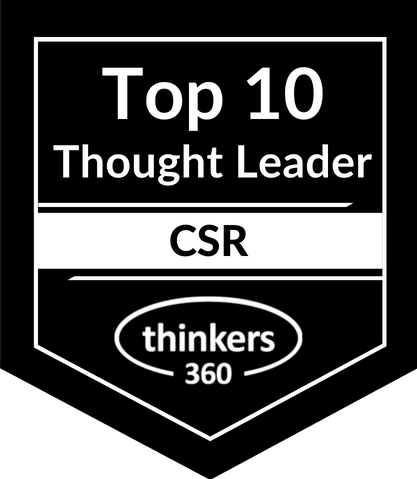


 Cultural Currents Shaping 2026.... The Post-Performative Tipping Point
Cultural Currents Shaping 2026.... The Post-Performative Tipping Point
 From Giving Tuesday to Everyday Trust
From Giving Tuesday to Everyday Trust
 Rethinking Brands in an Uncertain Age: From Newtonian control to Quantum coherence
Rethinking Brands in an Uncertain Age: From Newtonian control to Quantum coherence
 From Materials to Meaning: Seven principles for sustainability communication people can trust
From Materials to Meaning: Seven principles for sustainability communication people can trust
 What Still Holds True: Revisiting a 2022 Perspective on Doing Good
What Still Holds True: Revisiting a 2022 Perspective on Doing Good
 The Meaning of Freedom Is Shaping Our Future—Are Brands Paying Attention?
The Meaning of Freedom Is Shaping Our Future—Are Brands Paying Attention?
 Belonging Before Believing: An Imperative for Brands
Belonging Before Believing: An Imperative for Brands
 Reimagining Value: What Comes After Sustainability
Reimagining Value: What Comes After Sustainability
 Purpose Isn’t Dead—Reckoning with a Misunderstood Movement
Purpose Isn’t Dead—Reckoning with a Misunderstood Movement

 Do Good: Embracing Brand Citizenship to Fuel Both Purpose and Profit
Do Good: Embracing Brand Citizenship to Fuel Both Purpose and Profit


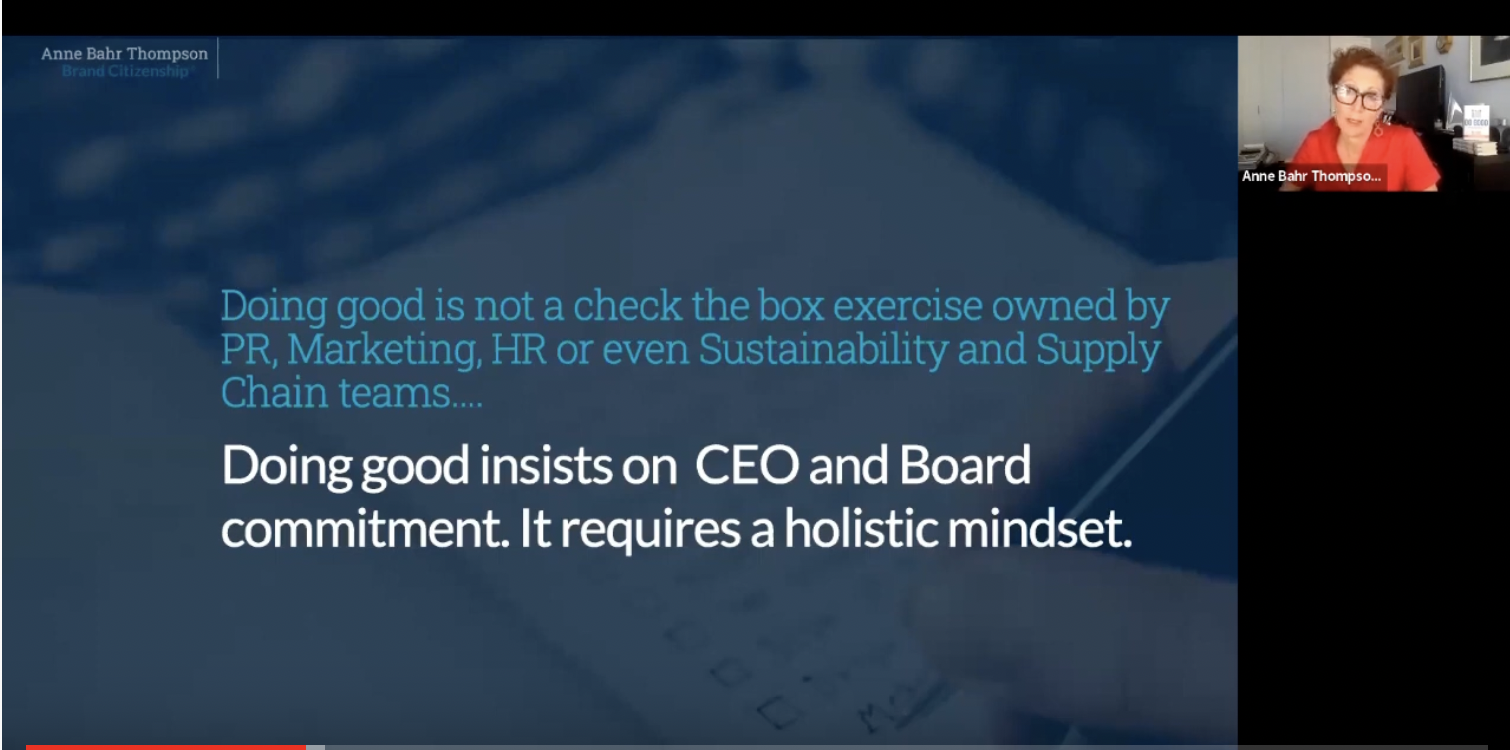 Doing Good: Leadership Obligation or Opportunity
Doing Good: Leadership Obligation or Opportunity
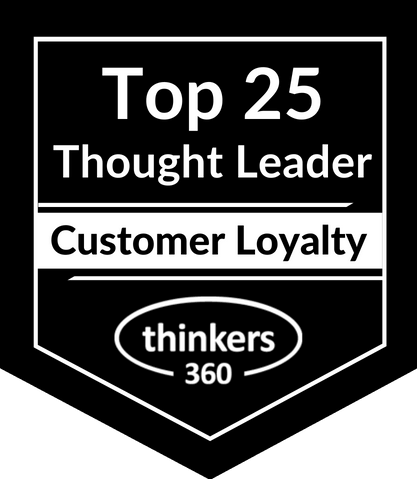
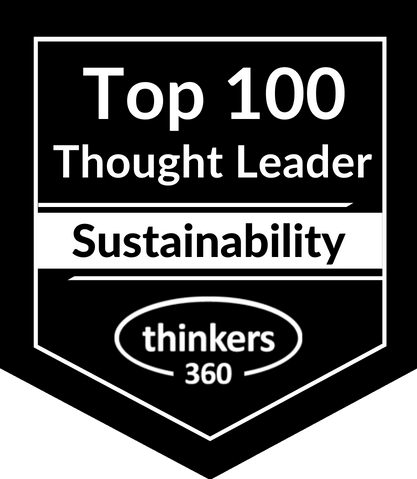
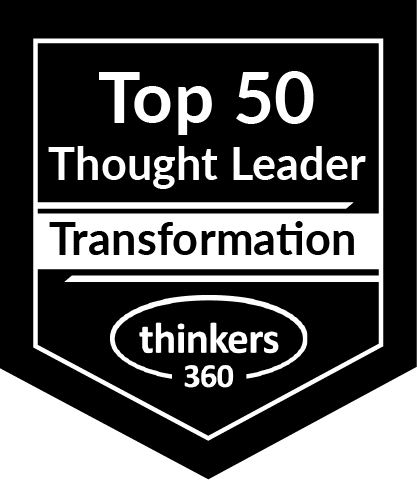
 Seven Cultural Trends Shaping 2025
Seven Cultural Trends Shaping 2025
 Elevating Brand Relationships: A New Era of Purpose and Humanity
Elevating Brand Relationships: A New Era of Purpose and Humanity
 Seven Guidelines for Healing-Centered Brand Leadership
Seven Guidelines for Healing-Centered Brand Leadership
 Purpose: From Performative Gestures to Strategic Value Creation
Purpose: From Performative Gestures to Strategic Value Creation
 Taking a Stand with Purpose in an Election Year: Navigating the Spectrum from Ally to Activist
Taking a Stand with Purpose in an Election Year: Navigating the Spectrum from Ally to Activist

 Shaping our Future: Themes for brand leadership in 2024
Shaping our Future: Themes for brand leadership in 2024
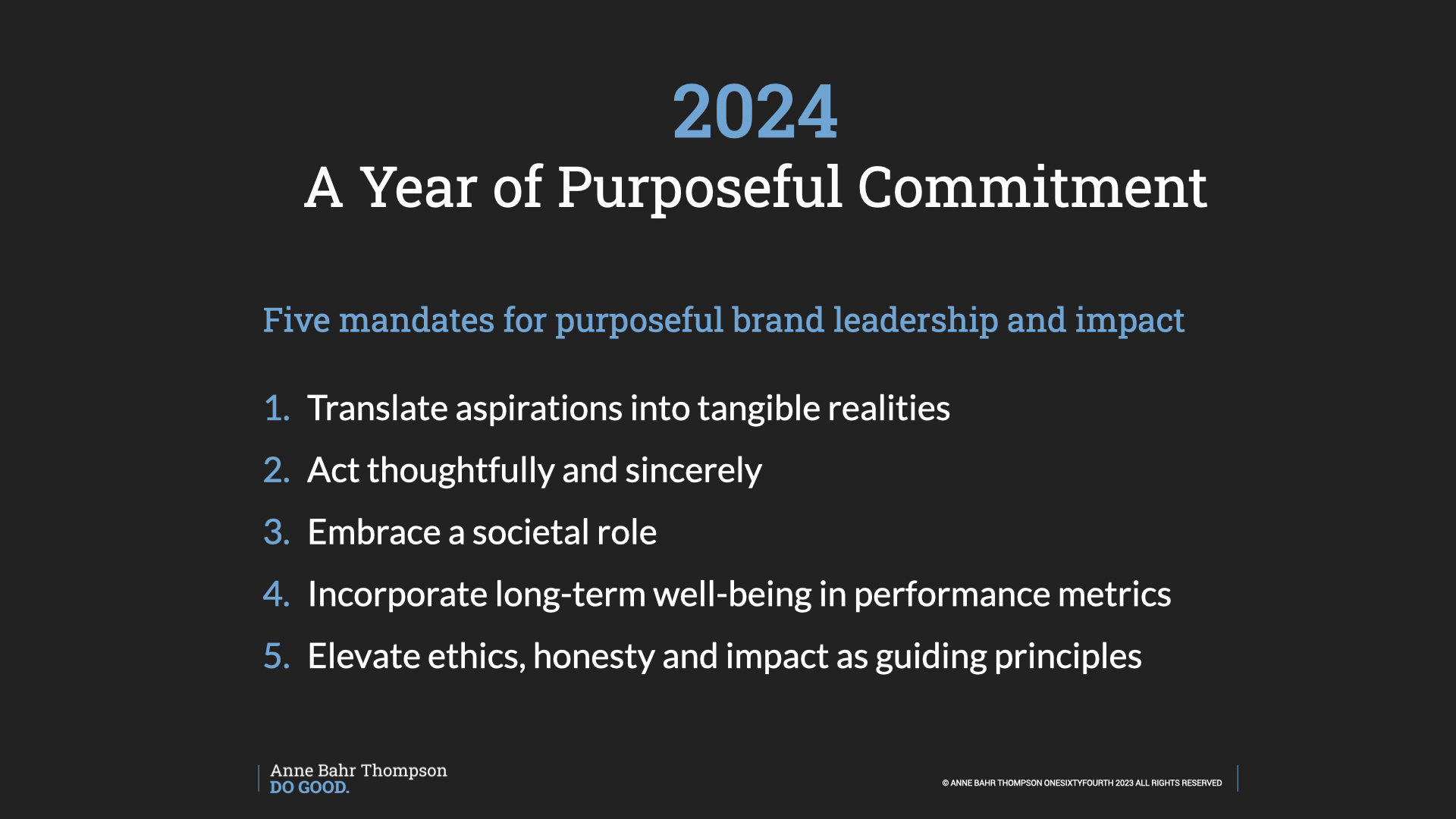 2024: Five Mandates for Purposeful Leadership and Impact
2024: Five Mandates for Purposeful Leadership and Impact
 The Importance of Connection: Lessons for Brands from an Unplugged Journey
The Importance of Connection: Lessons for Brands from an Unplugged Journey
 Brand Leaders: Choose transparency over greenhushing
Brand Leaders: Choose transparency over greenhushing



